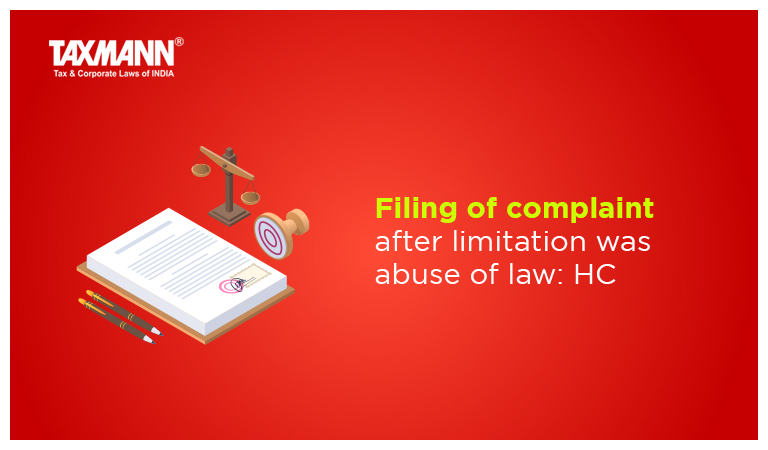Filing of complaint after limitation was abuse of law: HC
- News|Blog|Company Law|
- 2 Min Read
- By Taxmann
- |
- Last Updated on 1 September, 2022

Case Details: Vikram Kapur, Tamil Nadu Urban Infrastructure Financial Services v. Deputy Registrar of Companies - [2022] 141 taxmann.com 292 (HC-Madras)
Judiciary and Counsel Details
-
- M. Nirmal Kumar, J.
- N.R. Elango, Sr. Counsel & Ramesh Venkatachalapathy for the Petitioner.
- Dr D. Simon, Central Govt. Standing Counsel for the Respondent.
Facts of the Case
In the instant case, Registrar of Companies (RoC) found that the company fell under the ambit of cost audit and had not filed a cost audit report for the financial year 2013-14, even beyond the last date for submission, which was in contravention of section 148(6), and, thus, launched prosecution against the nominee directors of the Company (hereinafter referred as the ‘petitioners’) before Metropolitan Magistrate.
It was observed that for any violation under section 148(8) of the Companies Act, 2013, only a fine could be imposed. Further, as per section 468 of the Cr.P.C., the limitation period is six months i.e an action cannot be initiated after the expiry of the limitation period.
However, in the instant case, the complaint was filed and taken on file only in the year 2018, which was beyond the period of limitation.
Further, Section 148 got notified on 01.04.2014. The requisite turnover attracting appointment of Cost Accountant as a Cost Auditor had been complied with by resolution dated 28.06.2016 and Form CRA-4 for the financial year 2014-15 was filed by the Company.
A show cause notice was issued to the company on 29.08.2016, and a suitable reply was sent on 28.09.2016 informing the appointment of a Cost Accountant and filing of the requisite statutory forms. Thereafter, it cannot be stated to be a continuing offence. Further, any prosecution ought to have been initiated within a period of six months.
High Court Held
The High Court held that since the complaint was filed in the year 2018, it was beyond the period of limitation in terms of section 468 of the Cr.P.C. which prescribes six months period of limitation.
Since company had already complied and submitted requisite statutory documents and paid requisite fees, no case was made out against petitioners, warranting continuation of complaint and trial and, thus, continuance of case would amount to abuse of process of law.
Thus, proceedings pending against petitioners before Metropolitan Magistrate were to be quashed.
List of Cases Referred to
-
- Gokak Patel Volkart Ltd. v. Dundayya Gurushiddaiah Hiremath [1991] 2 SCC 141 (para 6)
- State of Bihar v. Deokaran Nenshi [1972] 2 SCC 890 (para 6)
- Teledata Technology Solutions Ltd. v. Deputy Registrar of Companies [2022] 137 taxmann.com 320/171 SCL 483 (Mad.) (para 8).
Disclaimer: The content/information published on the website is only for general information of the user and shall not be construed as legal advice. While the Taxmann has exercised reasonable efforts to ensure the veracity of information/content published, Taxmann shall be under no liability in any manner whatsoever for incorrect information, if any.

Taxmann Publications has a dedicated in-house Research & Editorial Team. This team consists of a team of Chartered Accountants, Company Secretaries, and Lawyers. This team works under the guidance and supervision of editor-in-chief Mr Rakesh Bhargava.
The Research and Editorial Team is responsible for developing reliable and accurate content for the readers. The team follows the six-sigma approach to achieve the benchmark of zero error in its publications and research platforms. The team ensures that the following publication guidelines are thoroughly followed while developing the content:
- The statutory material is obtained only from the authorized and reliable sources
- All the latest developments in the judicial and legislative fields are covered
- Prepare the analytical write-ups on current, controversial, and important issues to help the readers to understand the concept and its implications
- Every content published by Taxmann is complete, accurate and lucid
- All evidence-based statements are supported with proper reference to Section, Circular No., Notification No. or citations
- The golden rules of grammar, style and consistency are thoroughly followed
- Font and size that’s easy to read and remain consistent across all imprint and digital publications are applied



 CA | CS | CMA
CA | CS | CMA
